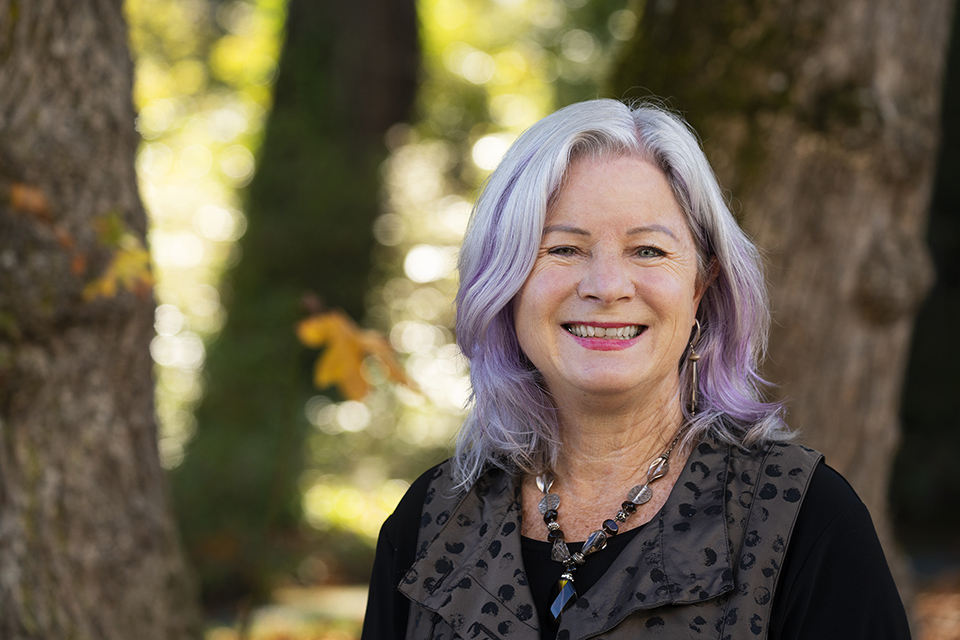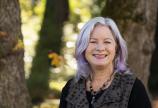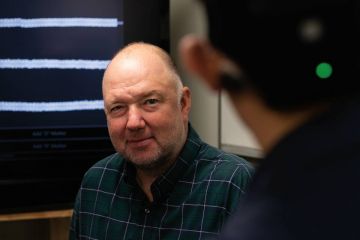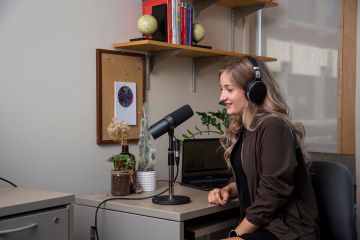New podcast aims to break the stigma of dementia

“Call to Mind” is a new podcast series from the University of Victoria about love and memory loss, recorded by people living with Alzheimer’s disease and other forms of dementia. The four-episode series launched this week on all podcast apps including Apple Podcasts and on the website CalltoMindPodcast.com.
Listen to the trailer below:
Hosted and led by Debra Sheets, a nursing professor and researcher with the Institute on Aging and Lifelong Health at UVic, the series features intimate audio diaries and conversations about the rewards and challenges of caregiving, the impacts of isolation, finding joy by living in the present and staying in love when everything else is changing. The eight people who shared their stories are all current or former members of the Voices in Motion choir, a professionally led dementia choir co-founded by Sheets.
Sheets says the participatory nature of the project was vital to its spirit and intent. Research assistants at UVic provided technical support to storytellers who used their own iPads and smart phones to make recordings in their own homes during the first 18 months of the pandemic. Sound artist and producer Jenni Schine then created four 30-minute narratives from the hours of audio clips each pair submitted, with sound design by David Parfit.
The caregivers in the podcast provide a starkly honest glimpse into the challenges but also the rewards of caregiving. There are poignant moments that are so precious and fleeting. There are struggles, crises and moments of exhaustion. It is in these personal stories that we can see the growing strain we are placing on caregivers. We must find another way and I hope this podcast helps move that conversation forward.
—UVic nursing professor Debra Sheets, lead of the new podcast series ‘Call to Mind’
Sheets wanted to address what she calls the “narrative scarcity” of older voices in the media by providing agency to people with memory loss and to their family caregivers, to “move the narrative away from one of tragedy, continuous decline, caregiving burden and fear, to one in which we see joy and love as well.”
More than half a million Canadians are currently living with Alzheimer’s disease or a related form of dementia. With a rapidly aging population, that number is projected to double by 2031. Over the next 20 years, the number of older Canadians with dementia requiring assistance will double.
Family caregivers provide 75 per cent of the care needed by older Canadians living at home. Every day, about one in four Canadians provide care for a family member, friend or neighbour. There are an estimated one-million caregivers in BC and eight million across Canada.
“While caregiving for older adults can be rewarding,” Sheets notes, “it is increasingly demanding, complex and stressful. The average informal caregiver spends 19 hours a week on caregiving duties, and one in 10 provides more than 30 hours of care per week.”
One of the storytellers is Brenda Brophy who, six months into the pandemic, brought her 100-year-old mother Dorothy out of long-term care to look after her at home. “For those not yet touched by dementia,” Brophy says, “I hope they hear our stories, find empathy and understanding for those impacted by dementia and for those who are caring for elders. And I want people to see and hear how seniors like my mom aren’t used up, or empty shells. They are still in there and they matter.”
Saskia Sivananthan, the chief research and knowledge, translation and exchange officer at the Alzheimer Society of Canada adds that the COVID-19 pandemic is disproportionately impacting people living with dementia in Canada, completely disrupting their daily lives, isolating them socially and increasing fatigue and burnout for their family caregivers. She says, “The ‘Call to Mind’ podcast series illustrates the unique challenges facing these families right now, while also underlining the hope that is present. It’s essential their stories and voices are heard.”
This series was made possible by UVic, with funding from the Social Sciences and Humanities Research Council, the Alzheimer Society of Canada, the Alzheimer Society of BC, Michael Smith Health Research BC and BC SUPPORT Unit Island Centre.
Additional quotes:
Lisa Kalynchuk, Vice President Research and Innovation, UVic:
"As part of our new Aspiration 2030 Research Strategy at UVic, the ‘Call to Mind’ podcast series demonstrates our commitment to creating a better world though curiosity, engagement and innovation. This new podcast on love and memory loss demonstrates our commitment to community-engaged impact-oriented research. This work reflects our research expertise in mental health and aging, which are signature areas of our UVic Health Initiative."
Isobel McKenzie, BC Seniors Advocate:
“Anyone who has been a caregiver to their loved one knows it is a physically and emotionally difficult job being the friend, confidant, housekeeper, cook, scheduler, driver, social support and more for what is often a 24/7 commitment. The ‘Call to Mind’ podcast series reveals the messy and fulfilling side of caregiving through real stories that are inspiring, uplifting and insightful.
Jim Mann, advocate living with Alzheimer's & recipient of honorary Doctor of Laws degree from UBC (2020):
“This project has produced a great resource for people who have a family member or friend living with dementia. The podcasts feature honest conversations between family members and a loved one living with dementia that are personal and insightful. Listeners are invited to be a part of the conversation that is intimate and very moving. This is real life, making the podcast series a valuable resource.”
Jennifer Perry, Manager, Advocacy & Education for the Alzheimer Society of B.C.:
“This podcast offers the listener an opportunity to learn about the rich and complex experiences of people affected by dementia, highlighting the moments of genuine connection and joy that are possible throughout the journey without shying away from the impact of the disease.”
Barb MacLean, Executive Director, Family Caregivers of BC:
"I believe this podcast series will open people’s minds and hearts to living life with dementia. It offers the chance to walk a mile in different shoes, fuel compassion and promote better support for the person living with dementia, their family caregivers and their broader circle of support.”
-- 30 --
A media kit containing photos, audio clips and visual assets for social media is available on Dropbox.
Photos
Media contacts
Debra Sheets (School of Nursing/Institute on Aging and Lifelong Health) at dsheets@uvic.ca
Suzanne Ahearne (University Communications + Marketing) at 250-721-6139 or sahearne@uvic.ca
In this story
Keywords: dementia, aging, COVID, Institute on Aging and Lifelong Health
People: Debra Sheets





